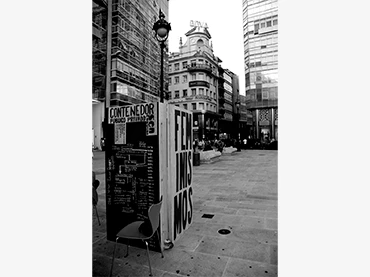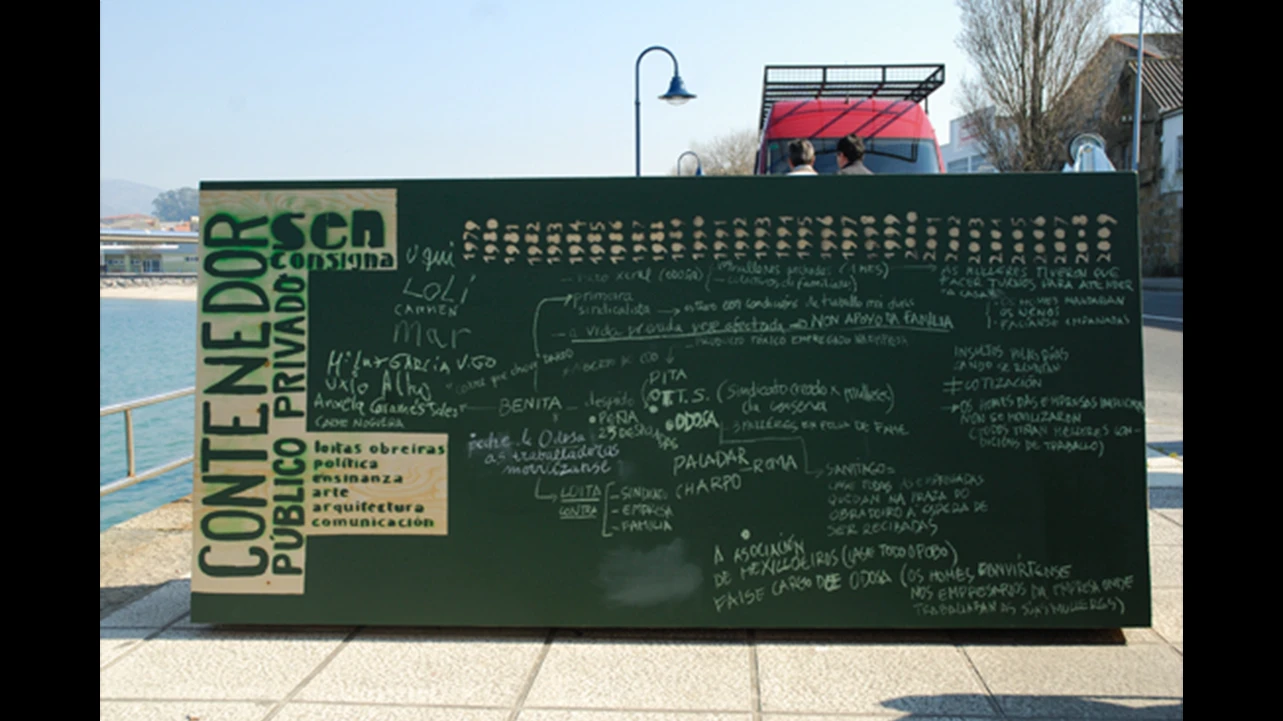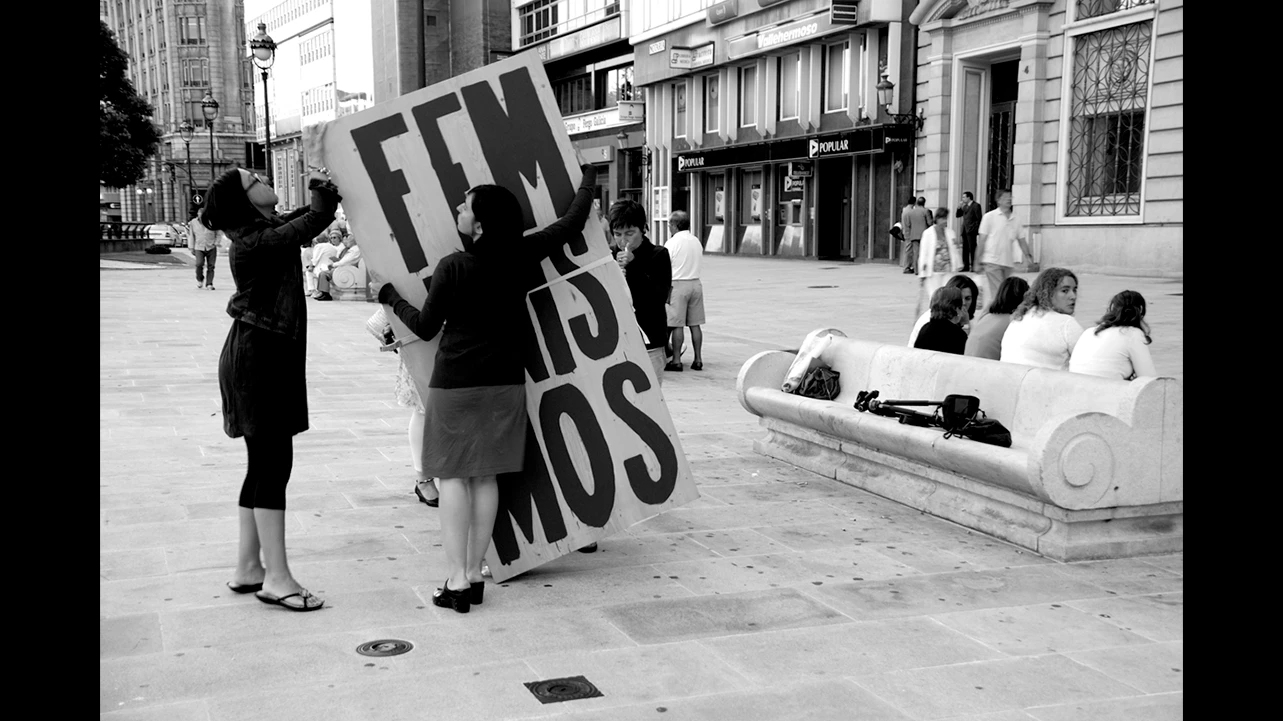
Held on 26 Mar 2022
The Contenedor de feminismos (Feminisms Container) is a sculpture and mobile archive devised and activated by artist Carme Nogueira and researchers Anxela Caramés and Uqui Permui and as a part of Episode 8. Exodus and Communal Life, the final chapter in the new presentation of the Museo Reina Sofía Collection. Designed to be used in public space, it seeks to recover, document and make visible the history of women, feminisms and struggles in this sphere.
Since 2009, different “docu-actions” — a term employed to designate an encounter or dialogue between women, on a specific theme, in public space — have been carried out, rescuing memory between the public and the private. Thus, the docu-action conducted in the Museo revolves around feminism and associationist syndicalism, starting from a key document in the history of the Container: a video of the closure of the Odosa cannery reflecting women’s experiences in the factory. The makers of the film also discovered the first women’s trade union, registered at the end of the 1980s, under the name OTTS (The Organisation of Female and Male Workers of Salnés), helping women workers to organise beyond the factory walls. The action will end with four women sharing their experiences of different labour and culture sectors — as well as the audience wishing to participate — to recover practices from the syndicalist world and to discover new forms of syndicalism, associationism and labour struggles developed under the umbrella of feminism. The materials created from this docu-action will be incorporated into the Container to form part of its archive.
Tensi Álvarez is a feminist activist in charge of the Secretariat for Equality at the Regional Union of Workers’ Commissions of A Coruña. She has actively participated in forming the feminist movement in Galicia from the Asociación Galega da Muller (The Galician Women’s Association, AGM), as well as in building syndicalism from this sphere through different positions, both inside the State Civil Service and from the union of Workers’ Commissions (CCOO). Moreover, she has been affiliated with the Galician Feminist Platform in A Coruña, working alongside other feminist organisations in 8M demonstrations.
Anxela Caramés is an art and feminisms researcher, curator, art critic and cultural producer. Her activities around contemporary art focus on issues related to gender studies, the ramifications of the social and the political, and art emerging from processes of creation, production, management, reflection and dissemination. Her projects include Seoanes Posibles. After Teresa de Villar (Fundación Luis Seoane, 2013), Miradas de mujer sobre la Guía Postal de Lugo de Maruja Mallo (Museo Provincial de Lugo, 2014) and Lost & Found. Archivos (Re)colectados (NORMAL Espazo de intervención cultural, 2014). As a co-founder, she has been involved in the Contenedor de feminismos project since 2008.
Maribel Doménech is an artist and lecturer in Sculpture at the Faculty of Fine Arts from the Valencia Polytechnic University. Her lines of research incorporate art, textile fabrics and technology to reflect on the intimate and the social in daily life via interdisciplinary installations. She has also been a member of the Laboratorio de Luz Research Group since 1990. Her works can be found in museums and collections in the Netherlands, Chile and Spain, and notable among her solo shows is Acciones cotidianas ([Daily Actions], Centre del Carme. Cultura Contemporània, 2020). She is also a member of Mujeres en las Artes Visuales (Women in Visual Arts, MAV).
Marta Echaves is a researcher and writer. Her projects are developed at the intersection of curatorial practice, writing and historiographic research, and she sets out to revisit images and metaphors associated with specific temporal contexts, from intimate lived experiences and anecdotes as detonating devices of poetics of memory. This is placed at the centre of work with oral memory and intimate archives, and the violence and loss intersecting them, in addition to demonstrating the need to rely upon practices and rituals of restitution and collective mourning. At present, she designs activities for the publisher Caja Negra and is a coordinator of Contar es escuchar (Telling Is Listening), an art research course in La Casa Encendida (Madrid).
Carme Nogueira is a visual artist whose work is aligned towards the overlapping of the public and the private via contextual practices. At the present time, she reflects on processes of subjectivation and the normalising role of spaces through photography and installation — in her most recent works, this issue materialises in a series of objects and actions for public space. Her most recent exhibition projects include Vida Hurdana. Lo que escriben los niños (Lalín Pintor Laxeiro Biennial, Museo Municipal Ramón María Aller, 2017), El Contrato (Alhóndiga Bilbao, 2014) and Múltiplos de 100 (Instituto de la Cultura y las Artes de Sevilla - ICAS, 2014). As a co-founder, she has been involved in the Contenedor de feminismos project since 2008.
Uqui Permui is an art director and graphic designer who works in the field of communication, design and audiovisuals, with a particular interest in the flows and dynamics of public space. Her most recent projects include the publication From Spain with Design ¿Refleja la imagen de España lo que diseñamos? promoted from the Spanish Network of Design Associations (Experimenta, 2020), the campaign En Negro Contra as Violencias (2015–2019) and the redesign of the brand Xacobeo 2021. As a co-founder, she has been involved in the Contenedor de feminismos project since 2008.
Territorio Doméstico is a group of female domestic workers living in the Community of Madrid which, since 2006, has been organised to call for the recognition of their rights as workers, defining their contribution to society through the direct link to care. Their main vindications pivot around the recognition of rights for domestic workers, and the worth of care work in a system that devalues it and makes it invisible and precarious despite being essential to upholding life. In 2019, they released the record Sin nosotras se para el mundo (Without Women the World Stops), a compilation of songs that give a voice to the situation these female workers face, and in 2020 they made Querían brazos y llegamos personas (They Wanted Arms But People Arrived), a radio drama and play on migration and domestic work.
Organised by
Museo Reina Sofía
Participants
Participants



Más actividades

Aesthetics of Peace and Desertion Tactics
8 October 2025 – 24 June 2026
The study group Aesthetics of Peace and Tactics of Desertion: Prefiguring New Pacifisms and Forms of Transitional Justice proposes a rethinking—through both a theoretical-critical and historical-artistic lens—of the intricate network of concepts and practices operating under the notion of pacifism. A term not without contestation and critical tension, pacifism gathers under its name a multiplicity of practices—from anti-militarism and anti-war movements to non-violence activism—while simultaneously opening urgent debates around violence, justice, reparation, and desertion. Here, pacifism is not conceived as a moral doctrine, but as an active form of ethical and political resistance capable of generating aesthetic languages and new positions of social imagination.
Through collective study, the group seeks to update critical debates surrounding the use of violence and non-violence, as well as to explore the conflict of their representation at the core of visual cultures. In a present marked by rearmament, war, genocide, and the collapse of the social contract, this group aims to equip itself with tools to, on one hand, map genealogies and aesthetics of peace—within and beyond the Spanish context—and, on the other, analyze strategies of pacification that have served to neutralize the critical power of peace struggles. Transitional and anti-punitive justice proposals will also be addressed, alongside their intersections with artistic, visual, and cinematic practices. This includes examining historical examples of tribunals and paralegal activisms initiated by artists, and projects where gestures, imaginaries, and vocabularies tied to justice, reparation, memory, and mourning are developed.
It is also crucial to note that the study programme is grounded in ongoing reflection around tactics and concepts drawn, among others, from contemporary and radical Black thought—such as flight, exodus, abolitionism, desertion, and refusal. In other words, strategies and ideas that articulate ways of withdrawing from the mandates of institutions or violent paradigms that must be abandoned or dismantled. From feminist, internationalist, and decolonial perspectives, these concepts have nourished cultural coalitions and positions whose recovery today is urgent in order to prefigure a new pacifism: generative, transformative, and radical.
Aesthetics of Peace and Tactics of Desertion, developed and led by the Museo Reina Sofía’s Studies Management, unfolds through biweekly sessions from October to June. These sessions alternate between theoretical discussions, screenings, work with artworks and archival materials from the Museo’s Collection, reading workshops, and public sessions. The group is structured around sustained methodologies of study, close reading, and collective discussion of thinkers such as Judith Butler, Elsa Dorlin, Juan Albarrán, Rita Segato, Sven Lütticken, Ruth Wilson Gilmore, and Franco “Bifo” Berardi; historical episodes such as the anti-nuclear and anti-arms race movement in Spain; and the work of artists and activists including Rojava Film Commune, Manuel Correa and the Oficina de Investigación Documental (Office for Documentary Investigation), and Jonas Staal, among other initial cases that will expand as the group progresses.

Institutional Decentralisation
Thursday, 21 May 2026 – 5:30pm
This series is organised by equipoMotor, a group of teenagers, young people and older people who have participated in the Museo Reina Sofía’s previous community education projects, and is structured around four themed blocks that pivot on the monstrous.
This fourth and final session centres on films that take the museum away from its axis and make it gaze from the edges. Pieces that work with that which is normally left out: peripheral territories, unpolished aesthetics, clumsy gestures full of intent. Instead of possessing an institutional lustre, here they are rough, precarious and strange in appearance, legitimate forms of making and showing culture. The idea is to think about what happens when central authority is displaced, when the ugly and the uncomfortable are not hidden, when they are recognised as part of the commons. Film that does not seek to be to one’s liking, but to open space and allow other ways of seeing and inhabiting the museum to enter stage.

Intergenerationality
Thursday, 9 April 2026 – 5:30pm
This series is organised by equipoMotor, a group of teenagers, young people and older people who have participated in the Museo Reina Sofía’s previous community education projects, and is structured around four themed blocks that pivot on the monstrous.
The third session gazes at film as a place from which to dismantle the idea of one sole history and one sole time. From a decolonial and queer perspective, it explores films which break the straight line of past-present-future, which mix memories, slow progress and leave space for rhythms which customarily make no room for official accounts. Here the images open cracks through which bodies, voices and affects appear, disrupting archive and questioning who narrates, and from where and for whom. The proposal is at once simple and ambitious: use film to imagine other modes of remembering, belonging and projecting futures we have not yet been able to live.

Remedios Zafra
Thursday March 19, 2026 - 19:00 h
The José Luis Brea Chair, dedicated to reflecting on the image and the epistemology of visuality in contemporary culture, opens its program with an inaugural lecture by essayist and thinker Remedios Zafra.
“That the contemporary antifeminist upsurge is constructed as an anti-intellectual drive is no coincidence; the two feed into one another. To advance a reactionary discourse that defends inequality, it is necessary to challenge gender studies and gender-equality policies, but also to devalue the very foundations of knowledge in which these have been most intensely developed over recent decades—while also undermining their institutional support: universities, art and research centers, and academic culture.
Feminism has been deeply linked to the affirmation of the most committed humanist thought. Periods of enlightenment and moments of transition toward more just social forms—sustained by education—have been when feminist demands have emerged most strongly. Awareness and achievements in equality increase when education plays a leading social role; thus, devaluing intellectual work also contributes to harming feminism, and vice versa, insofar as the bond between knowledge and feminism is not only conceptual and historical, but also intimate and political.
Today, antifeminism is used globally as the symbolic adhesive of far-right movements, in parallel with the devaluation of forms of knowledge emerging from the university and from science—mistreated by hoaxes and disinformation on social networks and through the spectacularization of life mediated by screens. These are consequences bound up with the primacy of a scopic value that for some time has been denigrating thought and positioning what is most seen as what is most valuable within the normalized mediation of technology. This inertia coexists with techno-libertarian proclamations that reactivate a patriarchy that uses the resentment of many men as a seductive and cohesive force to preserve and inflame privileges in the new world as techno-scenario.
This lecture will address this epochal context, delving into the synchronicity of these upsurges through an additional parallel between forms of patriarchal domination and techno-labor domination. A parallel in which feminism and intellectual work are both being harmed, while also sending signals that in both lie emancipatory responses to today’s reactionary turns and the neutralization of critique. This consonance would also speak to how the perverse patriarchal basis that turns women into sustainers of their own subordination finds its equivalent in the encouraged self-exploitation of cultural workers; in the legitimation of affective capital and symbolic capital as sufficient forms of payment; in the blurring of boundaries between life and work and in domestic isolation; or in the pressure to please and comply as an extended patriarchal form—today linked to the feigned enthusiasm of precarious workers, but also to technological adulation. In response to possible resistance and intellectual action, patriarchy has associated feminists with a future foretold as unhappy for them, equating “thought and consciousness” with unhappiness—where these have in fact been (and continue to be) levers of autonomy and emancipation.”
— Remedios Zafra

27th Contemporary Art Conservation Conference
Wednesday, 4, and Thursday, 5 March 2026
The 27th Contemporary Art Conservation Conference, organised by the Museo Reina Sofía’s Department of Conservation and Restoration, with the sponsorship of the Mapfre Foundation, is held on 4 and 5 March 2026. This international encounter sets out to share and debate experience and research, open new channels of study and reflect on conservation and the professional practice of restorers.
This edition will be held with in-person and online attendance formats, occurring simultaneously, via twenty-minute interventions followed by a five-minute Q&A.